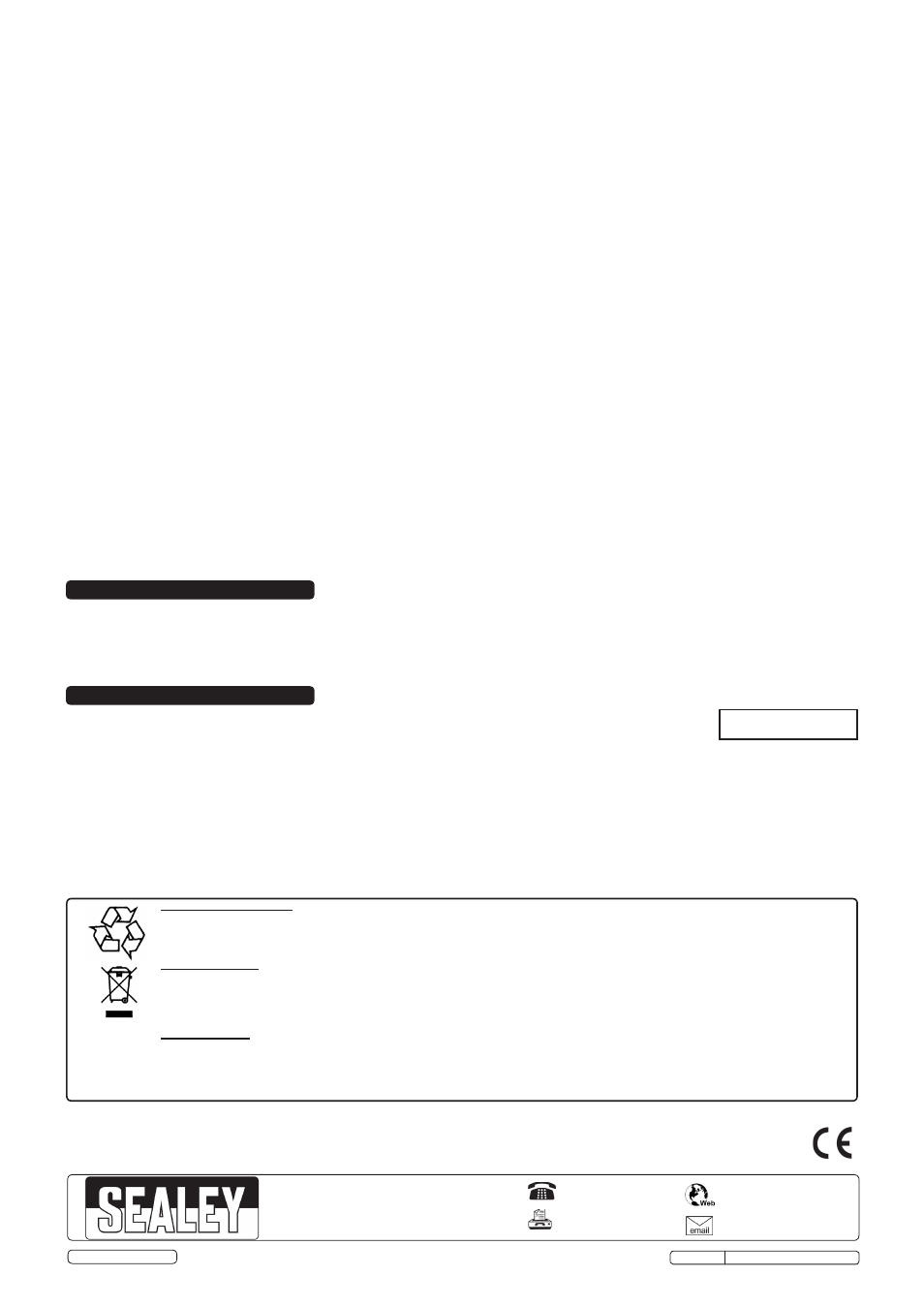Maintenance 6. operation – Sealey TA201 User Manual
Page 4

4.12.
Dwell Angle Measurement
Dwell angle is the number of degrees through which the distributor cam rotates while the breaker points are closed .
4 .12 .1 . Insert the black test lead into the negative “COM” jack and the red test lead into the positive + jack .
4 .12 .2 . Turn the rotary switch to the corresponding position of 2CYL, 3CYL, 4CYL, 5CYL, 6CYL, 8CYL OR 10CYL on the dwell range .
4 .12 .3 . Connect the black test lead to the Ground terminal (-) on the car battery and the red test lead to the contact breaker points or the negative (-) terminal
of the ignition coil .
4 .12 .4 . When the engine is started the Dwell will be displayed .
Note: To reduce the dwell angle reading the points gap must be increased, to increase the dwell angle the points gap must be reduced .
Refer to your owners handbook for detailed procedures for dwell settings and adjustments .
4.13.
Other Functions
4 .13 .1 . Your meter is also capable of testing the following automotive sensors .
Oxygen Sensors
Fuel Injectors
Temp Sensors
Position Sensors
absolute pressure (MAP) and Baro Sensors
Mass Air Flow (MAF) Sensors
4 .13 .2 . For a detailed description and testing procedure for these sensors, please refer to the vehicles hand book .
4.14.
Replacing The Battery
WARNING! To avoid electric shock, disconnect the test leads from any source of voltage before removing the battery door.
4 .14 .1 . When the battery become exhausted or drops below the operating voltage, “BAT” will be appear in the right hand side of the display . Replace the battery .
4 .14 .2 . Disconnect the leads from the meter .
4 .14 .3 . Gently pull away the protective plastic moulding cover to gain access to the rear of the meter .
4 .14 .4 . Open the battery door by loosening the two screws using a Philips head screw driver .
4 .14 .5 . Remove the old battery and insert the new one, observing the correct polarity .
4 .14 .6 . Replace the battery cover and secure with the two screws .
WARNING! To avoid electric shock, DO NOT operate the meter until the battery cover is secured in place.
4.15.
Replacing The Fuses
WARNING! To avoid electric shock, disconnect the test leads from any source of voltage before accessing the fuses.
4 .15 .1 . Disconnect the test leads from any item under test and disconnect them from the meter .
4 .15 .2 . Gently pull away the protective plastic moulding cover to gain access to the rear of the meter .
4 .15 .3 . Open the battery door by loosening the two screws using a Philips head screw driver .
4 .15 .4 . Remove the old fuse from its holder by gently pulling it out .
4 .15 .5 . Install the new fuse into its holder .
Note: Always use a fuse of the correct size and value .
0 .5A/250V fast blow for the 400mA range .
10A/250V fast blow for the 10A range .
4 .15 .6 . Replace the cover and secure with the two screws .
WARNING! To avoid electric shock, DO NOT use the meter until it has been fully re-assembled.
5. MAINTENANCE
6. OPERATION
Item Description
Parts
1
TEMPERATURE PROBE
TA201 .01
2
TEST LEADS
TA201 .02
3
CROCODILE CLIPS TA201 .03
4
HOLSTER TA201 .04
WARNING! DO NOT attempt to repair or service your meter unless you are qualified to do so and have the relevant calibration, performance test,
and service information . To avoid electrical shock or damage to the meter do not get water inside the case .
5.1.
Periodically wipe the case with a damp cloth and mild detergent . Do not use solvents .
5.2.
Turn the meter off when not in use and remove the battery if stored for a long period of time .
5.3.
Do not store the meter in a place of high humidity or high temperature .
ISSUE 1
DATE ISSUE
220404
Environmental Protection
Recycle unwanted materials instead of disposing of them as waste. All tools, accessories and packaging should be sorted, taken to
a recycle centre and disposed of in a manner which is compatible with the environment.
WEEE Regulations
Dispose of this product at the end of its working life in compliance with the EU Directive on
Waste Electrical and Electronic Equipment (WEEE). When the product is no longer required, it must be disposed
of in an environmentally protective way. Contact your local solid waste authority for recycling information.
Battery Removal: See Section 4.14.
ONLY dispose of or recycle according to local authority regulations. Under the Waste Batteries and Accumulators Regulations 2009,
Jack Sealey Ltd are required to inform potential purchasers of products containing batteries (as defined within these regulations),
that they are registered with Valpak’s registered compliance scheme. Jack Sealey Ltd’s Batteries Producer Registration Number
(BPRN) is BPRN00705.
NOTE: It is our policy to continually improve products and as such we reserve the right to alter data, specifications and component parts without prior notice.
IMPORTANT: No liability is accepted for incorrect use of this product .
WARRANTY: Guarantee is 12 months from purchase date, proof of which will be required for any claim .
INFORMATION: For a copy of our latest catalogue and promotions call us on 01284 757525 and leave your full name and address, including postcode .
01284 757500
01284 703534
sales@sealey .co .uk
Sole UK Distributor, Sealey Group,
Kempson Way, Suffolk Business Park
,
Bury St . Edmunds, Suffolk,
IP32 7AR
www .sealey .co .uk
Original Language Version
© Jack Sealey Limited
TA201 Issue No: 3(L) - 17/06/14
